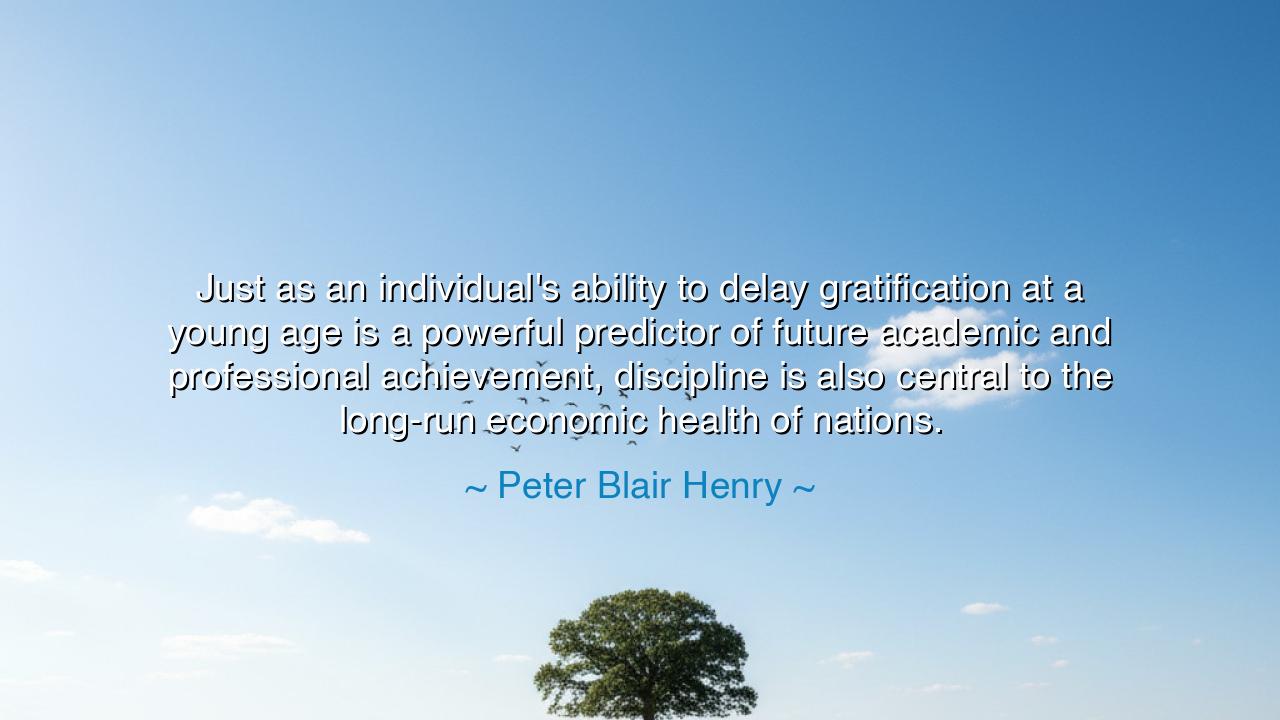
Just as an individual's ability to delay gratification at a young
Just as an individual's ability to delay gratification at a young age is a powerful predictor of future academic and professional achievement, discipline is also central to the long-run economic health of nations.






The scholar and economist Peter Blair Henry, a man who has gazed into the heart of nations and discerned the patterns of their rise and fall, once spoke these profound words: “Just as an individual’s ability to delay gratification at a young age is a powerful predictor of future academic and professional achievement, discipline is also central to the long-run economic health of nations.” In this statement, he binds together the destiny of the individual and the destiny of civilization, teaching us that the same virtues that uplift one soul also sustain the prosperity of an entire people. Discipline, that ancient virtue of restraint and foresight, is revealed not as mere restriction, but as the foundation of endurance, wisdom, and lasting strength.
In the ancient world, the philosophers of Greece and the sages of the East all taught that self-mastery was the highest form of freedom. The man who could govern his desires, they said, could govern cities and kingdoms. Henry’s words are a modern echo of that timeless wisdom. For the one who can delay gratification, who can resist the fleeting pleasure of the moment in service of a greater good, becomes the architect of their own destiny. Such discipline is not denial—it is the art of choosing the eternal over the immediate, the meaningful over the momentary. As in the life of one person, so too in the life of nations: those who sow with patience reap with abundance, but those who chase every appetite soon find their fields barren.
The origin of Henry’s insight lies both in economic truth and human nature. As an economist who studied the growth of nations, he saw that prosperity is not merely born of wealth, but of will. Countries that learned to save, invest, and endure hardship built lasting strength, while those that succumbed to corruption, indulgence, and short-sightedness fell into decay. This mirrors the story of every human life. The same discipline that propels a child to study while others play, that builds habits of patience and purpose, is the force that builds great civilizations. The microcosm of the mind reflects the macrocosm of society—both rise or fall by the same law of restraint.
Consider the example of Japan after the devastation of World War II. From ashes and ruin, a disciplined people rebuilt their nation through work, sacrifice, and collective purpose. They embraced delayed gratification, choosing savings over luxury, innovation over indulgence, unity over despair. Within a few decades, Japan transformed into one of the most advanced and prosperous nations on earth. This was not a miracle of chance, but of discipline—a national character forged by patience and perseverance. Where other nations sought comfort too soon, Japan chose endurance, and endurance gave birth to greatness.
So too, in the life of an individual, discipline is the unseen pillar of success. The young scholar who rises early to study while others sleep, the athlete who trains through fatigue, the artist who works despite doubt—these are the quiet heroes of progress. They understand that gratification postponed is not lost but magnified. The same principle governs the rise of empires and the flowering of genius: the strength to wait, the courage to persist, and the wisdom to hold fast to purpose when ease calls them astray.
Yet Henry’s teaching also carries a warning. For just as self-restraint builds strength, indulgence leads to decline. When nations spend beyond their means, when people seek pleasure before purpose, the rot begins—not immediately, but inevitably. The Roman Empire, once disciplined and formidable, fell not by the sword of the barbarian, but by the slow erosion of its own virtue. The citizens forgot the power of discipline, and the empire that had conquered the world could no longer conquer itself. Thus, the fate of nations mirrors the fate of souls: without discipline, both perish in comfort.
The lesson, then, is both personal and universal. Cultivate discipline as you would cultivate a garden, with care, patience, and persistence. In your own life, practice delayed gratification—save before you spend, learn before you lead, prepare before you act. Do not despise small beginnings, for they are the roots of greatness. And remember that what you do not master will master you. If you wish your nation to be strong, begin by strengthening your own habits, for the destiny of nations is built upon the character of its citizens.
So, O seeker of wisdom, remember the eternal symmetry of Peter Blair Henry’s words: the same law that guides the individual toward success guides the world toward prosperity. The patient hand builds lasting empires, while the impulsive hand builds only ruins. Choose restraint over indulgence, vision over vanity, and endurance over ease. For when the heart learns the virtue of discipline, both the man and his nation become unshakable—and in that steadfastness, they find not only prosperity, but peace.






AAdministratorAdministrator
Welcome, honored guests. Please leave a comment, we will respond soon